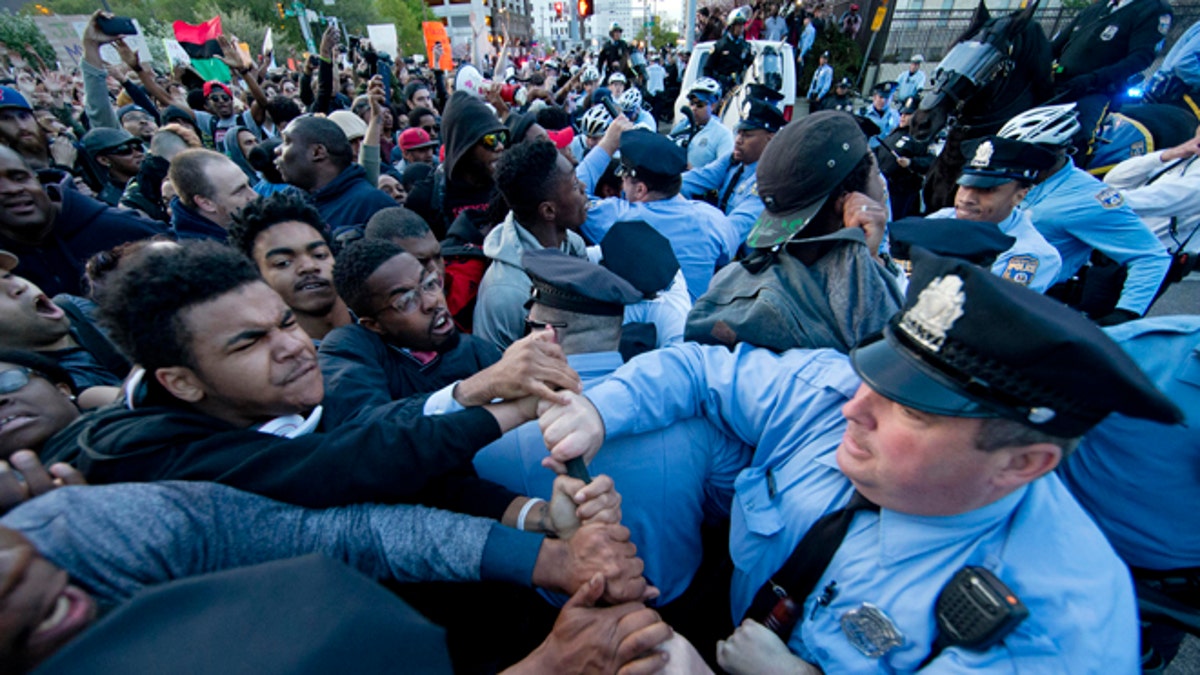
Protesters rush a police line after a rally at City Hall in Philadelphia on Thursday, April 30, 2015. The event in Philadelphia follows days of unrest in Baltimore amid Freddie Gray's police-custody death. (AP Photo/Matt Rourke)
Associated Press – May Day is a day labor activists take to the streets to advance the cause of workers worldwide. In recent years, in the U.S., their numbers have been swollen by people fighting for immigrants’ rights.
This year, police shootings will add to the mix.
Activists who are marching in U.S. cities on Friday say that they will broaden their message to direct attention toward police brutality as tensions simmer in communities across the nation. Early Friday, six Baltimore police officers were charged in Freddie Gray's death. The driver of the van Gray was in, Officer Caesar Goodson, Jr. was charged with second-degree murder and the other five face manslaughter and misconduct charges.
The marches on May 1 have their roots in labor movements, which hold annual demonstrations in a myriad of countries calling for workers' rights. In recent years, marches in the United States got a boost from immigrants seeking authorization to live and work in the country legally.
Some of the activists in cities from Boston to Oakland, California say they are also rallying in support of the growing movement that’s emerged from a series of high-profile deaths of black and Latino men as the result of a police encounter.
"It is important to support movements and struggles that stand up for people being singled out by the system. Right now, immigrants share that distinction with African-American youth, that we are being targeted by the system," said Miguel Paredes, membership coordinator of the Coalition for Humane Immigrant Rights of Los Angeles.
The move comes after unrest in Baltimore and protests in other cities over the death of Freddie Gray, who suffered severe spinal injuries at some point after he tried to run from police April 12.
Authorities' refusal to provide more than a few sketchy details about the Freddie Gray investigation is fueling suspicion and mistrust as a weekend of protest rallies looms.
The secrecy may be legally appropriate, but many in Baltimore were finding it hard to be patient Thursday when police revealed next to nothing about the criminal investigation they turned over to the state's attorney's office.
Nearly two weeks after Gray's death, the public still doesn't know much more than it did on Day One. The central question — what caused his fatal spinal cord injury while he was in police custody earlier this month — remains a mystery.
"The transparency is just not there," the Rev. Cortly "C.D." Witherspoon said after Police Commissioner Anthony Batts refused to answer any questions Thursday.
Batts said a 10 p.m. curfew for all residents and a state of emergency declared by Maryland Gov. Larry Hogan would remain in effect through Sunday. The curfew went into effect for the third night Thursday with no major incidents.
"We have two very large marches that are going to take place on the weekend," Batts told a news conference Thursday evening. "We have a lot more that are popping up by the minute."
Protests over Gray's death have been spreading and continuing in other parts country. Crowds gathered Thursday in Philadelphia and Baltimore. Other protests led to arrests in New York and elsewhere. All of which could get dramatically larger with labor and immigrant activists on Friday.
For more than a century, International Workers' Day has been celebrated on May 1 to mark the 1886 Haymarket Riot in Chicago, when a bomb turned a worker rally into a deadly event.
In the United States, the annual event has shrunk since 2006, when stringent immigration legislation drove hundreds of thousands of demonstrators to rally in the streets. Broadening the message could help bring new supporters to the push for immigration changes, but doing so isn't just a political strategy, leaders said, noting that immigrants share a distrust of police authority and concerns about racial inequality.
"This is one of these times where the savvy political move is also coherent political ideology," said David S. Meyer, a professor of sociology and political science at University of California, Irvine.
Some rallies are still mostly focused on labor and immigration issues, such as an event in Portland, Oregon, where advocates will support hiking the minimum wage and President Barack Obama's program to protect millions of immigrants in the country illegally from deportation.
Those issues will also be at the forefront of demonstrations in New York and Los Angeles, but activists are also expected to call for an end to what they see as police brutality against racial minorities. In New York, demonstrators will carry a banner reading "No police from Baltimore to Ayotzinapa," drawing a connection to the disappearance of 43 students in the Mexican state of Guerrero last year, said Teresa Gutierrez, co-coordinator of the May 1 Coalition.
What remains to be seen is whether expanding the message will have an impact. Meyer, who researches social movements, said demonstrations like these put an issue on the political agenda, but it is hard to know if, or when, they could effect change.
"They force politicians to take positions," he said. "When people are out and exposed, for you and against you, then it is sort of like the pieces on a chessboard are moving around, and the actual effect could be seen 20 moves down the road."
Like us on Facebook




















